That's About The Only Thing that Governments Have Done

[2005]
Lyrics by Ryan Harvey
Music: Sung to the tune of "The Biggest Thing that Man has Ever Done" by Woody Guthrie
Album: Love and Fear
Lyrics by Ryan Harvey
Music: Sung to the tune of "The Biggest Thing that Man has Ever Done" by Woody Guthrie
Album: Love and Fear
I horded all the fruits and all the vegetables and grains
(Continues)
(Continues)
Contributed by giorgio 2010/3/13 - 09:27
The Ballad Of The Hudson Valley Rent Strikes
[2005]
List of incidents of civil unrest in the United States
Album: Love and Fear
A story from A People's History of the U.S. by Howard Zinn http://en.wikipedia.org/wiki/Howard_Zinn
List of incidents of civil unrest in the United States
Album: Love and Fear
A story from A People's History of the U.S. by Howard Zinn http://en.wikipedia.org/wiki/Howard_Zinn
It was the fall of 1839, the place was New York State
(Continues)
(Continues)
Contributed by giorgio 2010/3/13 - 09:24
La Mouche au bras

La Mouche au bras
La Mouche au bras – Marco Valdo M.I. – 2010
Cycle du Cahier ligné – 97
La Mouche au bras est la nonante-septième chanson du Cycle du Cahier ligné, constitué d'éléments tirés du Quaderno a Cancelli de Carlo Levi.
La mouche au bras, la mouche au bras... Quel titre encore une fois ! , dit Lucien l'âne en se grattant le museau sur le tronc d'un saule têtard. La mouche au bras, qu'est-ce que çà veut dire, cette fois ? Où as-tu pêché un titre pareil ?
Ne t'énerve pas, mon ami Lucien l'âne impatient. Je m'en vais t'expliquer tout cela et pas plus tard que maintenant. Tu connais l'origine de ces canzones, la carrière où je m'en vais tirer les pierres brutes de cette construction:la traduction que j'ai faite du Quaderno a cancelli; c'est une sorte de roman, mais un roman paradoxal, où tout ce qui est écrit, dit, se passe à l'intérieur des pensées d'un homme : le peintre-écrivain... (Continues)
La Mouche au bras – Marco Valdo M.I. – 2010
Cycle du Cahier ligné – 97
La Mouche au bras est la nonante-septième chanson du Cycle du Cahier ligné, constitué d'éléments tirés du Quaderno a Cancelli de Carlo Levi.
La mouche au bras, la mouche au bras... Quel titre encore une fois ! , dit Lucien l'âne en se grattant le museau sur le tronc d'un saule têtard. La mouche au bras, qu'est-ce que çà veut dire, cette fois ? Où as-tu pêché un titre pareil ?
Ne t'énerve pas, mon ami Lucien l'âne impatient. Je m'en vais t'expliquer tout cela et pas plus tard que maintenant. Tu connais l'origine de ces canzones, la carrière où je m'en vais tirer les pierres brutes de cette construction:la traduction que j'ai faite du Quaderno a cancelli; c'est une sorte de roman, mais un roman paradoxal, où tout ce qui est écrit, dit, se passe à l'intérieur des pensées d'un homme : le peintre-écrivain... (Continues)
Fuir là-bas...
(Continues)
(Continues)
Contributed by Marco Valdo M.I. 2010/3/12 - 20:37
Ballata per un eroe

Ancora per Corrado.
Anch'io rivisito il sito solo ora, e scrivo per confermare che ricordo vagamente la parola postino nella strofa dimenticata...ma son passati più di trent'anni!
Comunque, per restare sulle canzoni d'autore di grande suggestione, per musica e parole, segnalo "C'è tempo" di Ivano Fossati e "Le rose blu" di Vecchioni, quest'ultima scritta per il figlio in un momento difficile, forse in pericolo di vita. Provo a fornire due link su YouTube, avvertendo che, coi nostri ritmi di accesso al sito, questi link potrebbero non essere più attivi al momento della prossima visita. Eccoli comunque, e buon ascolto!
http://www.youtube.com/watch?v=ALqkzO_Mg4c
http://www.youtube.com/watch?v=vcL-3HEtxjI
Anch'io rivisito il sito solo ora, e scrivo per confermare che ricordo vagamente la parola postino nella strofa dimenticata...ma son passati più di trent'anni!
Comunque, per restare sulle canzoni d'autore di grande suggestione, per musica e parole, segnalo "C'è tempo" di Ivano Fossati e "Le rose blu" di Vecchioni, quest'ultima scritta per il figlio in un momento difficile, forse in pericolo di vita. Provo a fornire due link su YouTube, avvertendo che, coi nostri ritmi di accesso al sito, questi link potrebbero non essere più attivi al momento della prossima visita. Eccoli comunque, e buon ascolto!
http://www.youtube.com/watch?v=ALqkzO_Mg4c
http://www.youtube.com/watch?v=vcL-3HEtxjI
Gianni 2010/3/12 - 18:28
I Can't See New York

canzone scritta per l'11 settembre 2001
From here
(Continues)
(Continues)
Contributed by miriam 2010/3/12 - 16:24
Song Itineraries:
September, 11: Attack on New York
One World
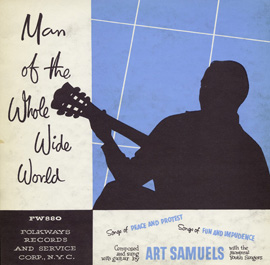
[1956]
Album “Man of the Whole Wide World”, Folkways Records
“An ideal is something to dream about, until it becomes a practical necessity for survival. Then it
calls, not for dreamers, but for planners. In this age of shrinking distances and long-range missiles,
even hard-headed ultra-nationalists must be beginning to realize that the choice is boiling down to co-existence or no-existence. Projected logically, then, it would seem that this could lead to a world
federation of states -- or, in the simpler term, one world.”
Album “Man of the Whole Wide World”, Folkways Records
“An ideal is something to dream about, until it becomes a practical necessity for survival. Then it
calls, not for dreamers, but for planners. In this age of shrinking distances and long-range missiles,
even hard-headed ultra-nationalists must be beginning to realize that the choice is boiling down to co-existence or no-existence. Projected logically, then, it would seem that this could lead to a world
federation of states -- or, in the simpler term, one world.”
You may talk of a world that’s divided,
(Continues)
(Continues)
Contributed by Alessandro 2010/3/11 - 14:14
Soldier Boy

[1956]
Album “Man of the Whole Wide World”, Folkways Records
"The sharply altered mood and the minor key variation l’m sure, won't keep you from detecting the ghost of Mademoiselle from Armentières, the lusty World War One marching song. . . and I won't pretend that the resemblence is an accident. Perhaps, these songs had their place, once… perhaps they still bring beery-nosta1gia to some… but I submit that they, like the wars that spawned them, have had their day, and that anyone who believes otherwise is living in the hopped-up past of the pre-Hiroshima era."
Album “Man of the Whole Wide World”, Folkways Records
"The sharply altered mood and the minor key variation l’m sure, won't keep you from detecting the ghost of Mademoiselle from Armentières, the lusty World War One marching song. . . and I won't pretend that the resemblence is an accident. Perhaps, these songs had their place, once… perhaps they still bring beery-nosta1gia to some… but I submit that they, like the wars that spawned them, have had their day, and that anyone who believes otherwise is living in the hopped-up past of the pre-Hiroshima era."
What’ll you do when you’re unemployed, Soldier Boy?
(Continues)
(Continues)
Contributed by Alessandro 2010/3/11 - 14:13
Man of the Whole Wide World

[1956]
Album “Man of the Whole Wide World”, Folkways Records
“I wrote this one some four years back, but unlike some of my earlier songs, if you were to ask me today to sit down and write about the things I believe in, I don't think the words would come out any different. I've sung it to a lot of people in a lot of places, and the way they respond seems to me to mean that most people are agreed on the fundamentals that would go to make a decent world -- not the least of which is peace.”
Album “Man of the Whole Wide World”, Folkways Records
“I wrote this one some four years back, but unlike some of my earlier songs, if you were to ask me today to sit down and write about the things I believe in, I don't think the words would come out any different. I've sung it to a lot of people in a lot of places, and the way they respond seems to me to mean that most people are agreed on the fundamentals that would go to make a decent world -- not the least of which is peace.”
Who am I and where do I come from?
(Continues)
(Continues)
Contributed by Alessandro 2010/3/11 - 13:38
Tabratt i lhukem

"[...] Il 25 settembre 1994, pochi giorni dopo l’inizio dello sciopero scolastico per l’introduzione del berbero nelle scuole, [Lounès Matoub] viene rapito da un commando di integralisti islamici. La cosa provoca una tale reazione compatta da parte di tutta la popolazione della Cabilia che i terroristi devono rilasciarlo dopo 15 giorni, il 10 ottobre. È la prima e unica volta che i terroristi islamici devono fare marcia indietro.
Ma la sua sorte è segnata. Condannato a morte dai terroristi per la sua aperta professione di laicismo, sceglie di restare nel suo paese e di non riparare all’estero dove sarebbe stato più protetto, e viene assassinato da un commando mascherato il 25 giugno 1998 a Oued Aissi, vicino al suo paese natale. Mancavano pochi giorni all’uscita del suo ultimo album, “Tabratt i lhukem” (“Lettera aperta”), un vero e proprio “testamento spirituale” in cui Matoub denuncia apertamente... (Continues)
Ma la sua sorte è segnata. Condannato a morte dai terroristi per la sua aperta professione di laicismo, sceglie di restare nel suo paese e di non riparare all’estero dove sarebbe stato più protetto, e viene assassinato da un commando mascherato il 25 giugno 1998 a Oued Aissi, vicino al suo paese natale. Mancavano pochi giorni all’uscita del suo ultimo album, “Tabratt i lhukem” (“Lettera aperta”), un vero e proprio “testamento spirituale” in cui Matoub denuncia apertamente... (Continues)
Alessandro 2010/3/11 - 12:50
Festa d'aprile

la versione degli yo yo mundi, insieme a tutto il disco Resistenza
Festa d'aprile
Festa d'aprile
matteo88 2010/3/11 - 11:21
Ninna nanna delle dodici mamme

Per me è uno dei più bei ricordi d'infanzia.
Un mondo bello che ormai non c'è più.
Un grazie alla mia Mamma che me l'ha sempre cantata.
Mi ha commosso rileggerla.
Un mondo bello che ormai non c'è più.
Un grazie alla mia Mamma che me l'ha sempre cantata.
Mi ha commosso rileggerla.
Alessandro Egidio Guido A. 2010/3/10 - 21:53
Matin cholérique

Matin cholérique
Matin cholérique – Marco Valdo M.I. – 2010
Cycle du Cahier ligné – 96
Matin cholérique est la nonante-sixième chanson du Cycle du Cahier ligné, constitué d'éléments tirés du Quaderno a Cancelli de Carlo Levi.
Encore une fois, mon ami Marco Valdo M.I., je trouve le titre de la canzone bien étrange. Mais il doit bien avoir à voir avec son contenu. Laisse-moi deviner... Comme il s'agit d'une canzone léviane, qu'elle fait partie du cycle du Cahier ligné, dès lors, il s'agit d'un moment de la méditation de notre ami le prisonnier-blessé. Ce moment est clairement dit : c'est le matin. Où je comprends moins bien, c'est cet adjectif qui s'y accole : cholérique. Il ne s'agit évidemment pas de la colère, mais du choléra, cette maladie souvent mortelle et en tous cas, porteuse de fièvres terribles.
Eh bien, Lucien l'âne mon ami, c'est exactement çà. Ton raisonnement est parfait.... (Continues)
Matin cholérique – Marco Valdo M.I. – 2010
Cycle du Cahier ligné – 96
Matin cholérique est la nonante-sixième chanson du Cycle du Cahier ligné, constitué d'éléments tirés du Quaderno a Cancelli de Carlo Levi.
Encore une fois, mon ami Marco Valdo M.I., je trouve le titre de la canzone bien étrange. Mais il doit bien avoir à voir avec son contenu. Laisse-moi deviner... Comme il s'agit d'une canzone léviane, qu'elle fait partie du cycle du Cahier ligné, dès lors, il s'agit d'un moment de la méditation de notre ami le prisonnier-blessé. Ce moment est clairement dit : c'est le matin. Où je comprends moins bien, c'est cet adjectif qui s'y accole : cholérique. Il ne s'agit évidemment pas de la colère, mais du choléra, cette maladie souvent mortelle et en tous cas, porteuse de fièvres terribles.
Eh bien, Lucien l'âne mon ami, c'est exactement çà. Ton raisonnement est parfait.... (Continues)
En un lieu maintenant familier
(Continues)
(Continues)
Contributed by Marco Valdo M.I. 2010/3/10 - 17:25
27 de Noviembre

(J. Martí, S. González)
Cadáveres amados los que un día
(Continues)
(Continues)
Contributed by DonQuijote82 2010/3/9 - 18:05
Which Side Are You On?

Apprendo dalle note che accompagnano il disco "Talking Union and Other Union Songs", con Pete Seeger, The Almanac Singers e The Song Swappers (Folkways Records, 1955) che la seguente strofa di questa canzone:
"My daddy was a miner,
And I'm a miner's son,
And I'll stick with the union
'Til every battle's won."
è da attribuirsi ad una modifica ad opera degli Almanac Singers.
La strofa originaria della Reece era la seguente:
"My daddy was a miner;
he's now in the air and sun
He'll be with you, fellow workers,
until this battle's won."
dove "in the air and sun" significa che il minatore non era in galleria ma disoccupato perchè "blacklisted" dai padroni a causa del suo attivismo sindacale...
"My daddy was a miner,
And I'm a miner's son,
And I'll stick with the union
'Til every battle's won."
è da attribuirsi ad una modifica ad opera degli Almanac Singers.
La strofa originaria della Reece era la seguente:
"My daddy was a miner;
he's now in the air and sun
He'll be with you, fellow workers,
until this battle's won."
dove "in the air and sun" significa che il minatore non era in galleria ma disoccupato perchè "blacklisted" dai padroni a causa del suo attivismo sindacale...
Alessandro 2010/3/9 - 14:04
General De Gaulle
Anonymous
[1962]
Album “Songs of F.L.N. - Freedom Fighters of Algeria” (sung in arabic), Folkways Records.
Canzone satirica contro la Francia ed il suo presidente-generale, la cui linea di condotta rispetto alla questione algerina fu incomprensibile, fra strizzate d’occhio ai pied-noirs, negoziati segreti per una transizione pacifica verso l’indipendenza e feroci repressioni, salvo poi doversi arrendere all’evidenza della storia…
Album “Songs of F.L.N. - Freedom Fighters of Algeria” (sung in arabic), Folkways Records.
Canzone satirica contro la Francia ed il suo presidente-generale, la cui linea di condotta rispetto alla questione algerina fu incomprensibile, fra strizzate d’occhio ai pied-noirs, negoziati segreti per una transizione pacifica verso l’indipendenza e feroci repressioni, salvo poi doversi arrendere all’evidenza della storia…
A tree walks in the streets
(Continues)
(Continues)
Contributed by Alessandro 2010/3/9 - 11:19
Song Itineraries:
The Algerian War
Cima Vallona

Grande FrncezGùccio. O interpretato dai Nomadi o dall'Equipe, o dalla Caselli il suo stile è sempre inconfondibile!
Saverio 2010/3/9 - 07:28
Story of Today

[1962]
Album “Songs of F.L.N. - Freedom Fighters of Algeria” (sung in arabic), Folkways Records.
Testo e musica di Farid Ali (1919-1981), poeta, musicista e combattente algerino, originario della Cabilia. Infatti il testo era originariamente in cabilo, uno dei dialetti berberi parlati in Algeria.
Album “Songs of F.L.N. - Freedom Fighters of Algeria” (sung in arabic), Folkways Records.
Testo e musica di Farid Ali (1919-1981), poeta, musicista e combattente algerino, originario della Cabilia. Infatti il testo era originariamente in cabilo, uno dei dialetti berberi parlati in Algeria.
Listen to this story,
(Continues)
(Continues)
Contributed by Alessandro 2010/3/8 - 15:42
Song Itineraries:
The Algerian War
Hymn Of Underground
Anonymous

[1962]
Album “Songs of F.L.N. - Freedom Fighters of Algeria” (sung in arabic), Folkways Records.
Testo e musica di autore anonimo.
Eseguita da un coro di combattenti dell’F.L.N., il Fronte di Liberazione algerino.
Cantata in arabo, ma sul libretto che accompagna il disco c’è solo la traduzione in inglese… ci accontentiamo?
“It is the most famous hymn between partisan troupe, which became so important that was used as opening theme by the programs broadcasted by the "voice of Algerian Republic".
[nota introduttiva al brano dal libretto che accompagna l’album]
Album “Songs of F.L.N. - Freedom Fighters of Algeria” (sung in arabic), Folkways Records.
Testo e musica di autore anonimo.
Eseguita da un coro di combattenti dell’F.L.N., il Fronte di Liberazione algerino.
Cantata in arabo, ma sul libretto che accompagna il disco c’è solo la traduzione in inglese… ci accontentiamo?
“It is the most famous hymn between partisan troupe, which became so important that was used as opening theme by the programs broadcasted by the "voice of Algerian Republic".
[nota introduttiva al brano dal libretto che accompagna l’album]
We swear on misfortunes and destruction
(Continues)
(Continues)
Contributed by Alessandro 2010/3/8 - 14:45
Song Itineraries:
The Algerian War
Free the Land
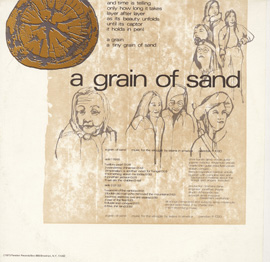
[1973]
Album “A Grain of Sand: Music for the Struggle by Asians in America”, Paredon Records.
Con Chris Kando Iijima, Joanne Nobuko Miyamoto e "Charlie" Chin.
Prodotto da Barbara Dane
“This song was written for a friend, sister Ibidun, and for a nation, the Republic of New Africa.
They say "free the land," as it captures a key concept in their struggle: land and sovereignty for blacks within the U.S. But we see this phrase as significant for all people who have worked and struggled in, and been oppressed by, this country. The land must be freed so that those who live and work on it will live in freedom. We will win! In the name of Malcolm, free the land…”
[nota introduttiva al brano dal libretto che accompagna l’album]
Diversamente da quanto può apparire dall’introduzione, questa canzone non è dedicata alla lotta dei neri sudafricani contro l’apartheid ma alla Republic of New Afrika... (Continues)
Album “A Grain of Sand: Music for the Struggle by Asians in America”, Paredon Records.
Con Chris Kando Iijima, Joanne Nobuko Miyamoto e "Charlie" Chin.
Prodotto da Barbara Dane
“This song was written for a friend, sister Ibidun, and for a nation, the Republic of New Africa.
They say "free the land," as it captures a key concept in their struggle: land and sovereignty for blacks within the U.S. But we see this phrase as significant for all people who have worked and struggled in, and been oppressed by, this country. The land must be freed so that those who live and work on it will live in freedom. We will win! In the name of Malcolm, free the land…”
[nota introduttiva al brano dal libretto che accompagna l’album]
Diversamente da quanto può apparire dall’introduzione, questa canzone non è dedicata alla lotta dei neri sudafricani contro l’apartheid ma alla Republic of New Afrika... (Continues)
Free the land
(Continues)
(Continues)
Contributed by Alessandro 2010/3/8 - 13:57
Divide and Conquer

[1973]
Album “A Grain of Sand: Music for the Struggle by Asians in America”, Paredon Records.
Con Chris Kando Iijima, Joanne Nobuko Miyamoto e "Charlie" Chin.
Prodotto da Barbara Dane
“The tactic of dividing the people in order to conquer them is a tactic which capitalism has used in this country very effectively. It has not only kept different races apart, it has kept sexes, religions, ages, occupations, just about everything divided. People have been taught we must compete against one another, and that we threaten each others interests. It has even affected us personally in feelings of alienation from each other and ourselves, so that we are isolated and alone. We are not alone - our interests are the same as all people fighting against the common oppressor. Our struggle for unity is a critical struggle, and it is vital for victory.”
[nota introduttiva al brano dal libretto che accompagna l’album]
Album “A Grain of Sand: Music for the Struggle by Asians in America”, Paredon Records.
Con Chris Kando Iijima, Joanne Nobuko Miyamoto e "Charlie" Chin.
Prodotto da Barbara Dane
“The tactic of dividing the people in order to conquer them is a tactic which capitalism has used in this country very effectively. It has not only kept different races apart, it has kept sexes, religions, ages, occupations, just about everything divided. People have been taught we must compete against one another, and that we threaten each others interests. It has even affected us personally in feelings of alienation from each other and ourselves, so that we are isolated and alone. We are not alone - our interests are the same as all people fighting against the common oppressor. Our struggle for unity is a critical struggle, and it is vital for victory.”
[nota introduttiva al brano dal libretto che accompagna l’album]
Have you ever woken,
(Continues)
(Continues)
Contributed by Alessandro 2010/3/8 - 13:35
War of the Flea

[1973]
Album “A Grain of Sand: Music for the Struggle by Asians in America”, Paredon Records.
Con Chris Kando Iijima, Joanne Nobuko Miyamoto e "Charlie" Chin.
Prodotto da Barbara Dane
Una canzone dedicata alla lotta di liberazione vietnamita.
“People's war has shown that small, oppressed nations can defeat the most highly technological military machine in the world - the U.S. This song is a celebration of that truth and to those who have shown us, in the belly of the monster, that truth.”
[nota introduttiva al brano dal libretto che accompagna l’album]
Album “A Grain of Sand: Music for the Struggle by Asians in America”, Paredon Records.
Con Chris Kando Iijima, Joanne Nobuko Miyamoto e "Charlie" Chin.
Prodotto da Barbara Dane
Una canzone dedicata alla lotta di liberazione vietnamita.
“People's war has shown that small, oppressed nations can defeat the most highly technological military machine in the world - the U.S. This song is a celebration of that truth and to those who have shown us, in the belly of the monster, that truth.”
[nota introduttiva al brano dal libretto che accompagna l’album]
Song of the night,
(Continues)
(Continues)
Contributed by Alessandro 2010/3/8 - 13:27
Warriors Of The Rainbow
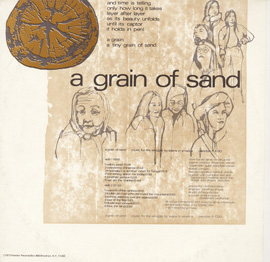
[1973]
Album “A Grain of Sand: Music for the Struggle by Asians in America”, Paredon Records.
Con Chris Kando Iijima, Joanne Nobuko Miyamoto e "Charlie" Chin.
Prodotto da Barbara Dane
“In Chicago in the summer of 1970, we met with some Indian brothers and sisters who were squatting for decent housing for their people. They told us of an old Indian legend (we don‘t know which nation it came from). The legend said that for 5.000 years the world would be ruled by evil followed by 5.000 years of good, that change would be brought about with the coming together of warriors of all colors of the rainbow, and that the time for that change is now…”
[nota introduttiva al brano dal libretto che accompagna l’album]
Quella dei “guerrieri dell’arcobaleno” è una profezia dei nativi americani appartenenti alla nazione Hopi, Arizona, ma leggende simili sono riscontrabili anche tra Cree e Cherokee. Il... (Continues)
Album “A Grain of Sand: Music for the Struggle by Asians in America”, Paredon Records.
Con Chris Kando Iijima, Joanne Nobuko Miyamoto e "Charlie" Chin.
Prodotto da Barbara Dane
“In Chicago in the summer of 1970, we met with some Indian brothers and sisters who were squatting for decent housing for their people. They told us of an old Indian legend (we don‘t know which nation it came from). The legend said that for 5.000 years the world would be ruled by evil followed by 5.000 years of good, that change would be brought about with the coming together of warriors of all colors of the rainbow, and that the time for that change is now…”
[nota introduttiva al brano dal libretto che accompagna l’album]
Quella dei “guerrieri dell’arcobaleno” è una profezia dei nativi americani appartenenti alla nazione Hopi, Arizona, ma leggende simili sono riscontrabili anche tra Cree e Cherokee. Il... (Continues)
Rain storm, winds blow
(Continues)
(Continues)
Contributed by Alessandro 2010/3/8 - 13:17
We Are The Children

[1973]
Album “A Grain of Sand: Music for the Struggle by Asians in America”, Paredon Records.
Con Chris Kando Iijima, Joanne Nobuko Miyamoto e "Charlie" Chin.
Prodotto da Barbara Dane
“This is another another first songs we wrote. It only touched on our people's plight and experiences in this country. We've heard that sisters and brothers in Hawaii and other places have added verses to it. We say right on -- it is your song.”
[nota introduttiva al brano dal libretto che accompagna l’album]
Album “A Grain of Sand: Music for the Struggle by Asians in America”, Paredon Records.
Con Chris Kando Iijima, Joanne Nobuko Miyamoto e "Charlie" Chin.
Prodotto da Barbara Dane
“This is another another first songs we wrote. It only touched on our people's plight and experiences in this country. We've heard that sisters and brothers in Hawaii and other places have added verses to it. We say right on -- it is your song.”
[nota introduttiva al brano dal libretto che accompagna l’album]
We are the children of the migrant worker
(Continues)
(Continues)
Contributed by Alessandro 2010/3/8 - 12:51
Il mio onore

dall'album "La Ruota", 2010
Finalista Voci per la libertà 2011
(DonQuijote82)
(DonQuijote82)
Lungo strade di confine
(Continues)
(Continues)
Contributed by Silvia 2010/3/8 - 12:24
Jonathan Jackson

[1973]
Album “A Grain of Sand: Music for the Struggle by Asians in America”, Paredon Records.
Con Chris Kando Iijima, Joanne Nobuko Miyamoto e "Charlie" Chin.
Prodotto da Barbara Dane
“When we hear about revolutionary heroes like Jonathan Jackson (who was shot at San Marin Courthouse trying to free his brother George), we tend to put them into some superhuman category. What we want to say is that Jonathan Jackson, like Nguyen Van Trol, like Che Guevara, was first a human being like us; a human being with feelings, joys, and fears, and that we all have that revolutionary potential. Jonathan Jackson is not separate from us, but part of us and what he stood for, is us.”
[nota introduttiva al brano dal libretto che accompagna l’album]
Sui fratelli Jackson si vedano anche George Jackson e Uncle George.
Album “A Grain of Sand: Music for the Struggle by Asians in America”, Paredon Records.
Con Chris Kando Iijima, Joanne Nobuko Miyamoto e "Charlie" Chin.
Prodotto da Barbara Dane
“When we hear about revolutionary heroes like Jonathan Jackson (who was shot at San Marin Courthouse trying to free his brother George), we tend to put them into some superhuman category. What we want to say is that Jonathan Jackson, like Nguyen Van Trol, like Che Guevara, was first a human being like us; a human being with feelings, joys, and fears, and that we all have that revolutionary potential. Jonathan Jackson is not separate from us, but part of us and what he stood for, is us.”
[nota introduttiva al brano dal libretto che accompagna l’album]
Sui fratelli Jackson si vedano anche George Jackson e Uncle George.
Never met a man who said
(Continues)
(Continues)
Contributed by Alessandro 2010/3/8 - 12:09
Imperialism Is Another Word For Hunger

[1973]
Album “A Grain of Sand: Music for the Struggle by Asians in America”, Paredon Records.
Con Chris Kando Iijima, Joanne Nobuko Miyamoto e "Charlie" Chin.
Prodotto da Barbara Dane
“As the struggle against U.S. imperialism around the world intensifies, our task here is to give the people in America a better understanding and fuller awareness of what U.S. Imperialism is, what it does, and what we must do to combat it. Our purpose in writing “imperialism" was two-fold; One, to help break down the "mystique" of words like imperialism which the governments propaganda has injected into the minds of the people -- to equate imperialism with everyday concepts so people feel more at ease with hearing it and talking about it; two, to help us break down our own dependence on rhetoric so that we may better be able to communicate with those we are trying to serve.
Obviously, that is a tall order... (Continues)
Album “A Grain of Sand: Music for the Struggle by Asians in America”, Paredon Records.
Con Chris Kando Iijima, Joanne Nobuko Miyamoto e "Charlie" Chin.
Prodotto da Barbara Dane
“As the struggle against U.S. imperialism around the world intensifies, our task here is to give the people in America a better understanding and fuller awareness of what U.S. Imperialism is, what it does, and what we must do to combat it. Our purpose in writing “imperialism" was two-fold; One, to help break down the "mystique" of words like imperialism which the governments propaganda has injected into the minds of the people -- to equate imperialism with everyday concepts so people feel more at ease with hearing it and talking about it; two, to help us break down our own dependence on rhetoric so that we may better be able to communicate with those we are trying to serve.
Obviously, that is a tall order... (Continues)
It's just another word for hunger,
(Continues)
(Continues)
Contributed by Alessandro 2010/3/8 - 11:49
Pasionaria

Dedicata a Dolores Ibárruri
Sí, veremos a Dolores caminar
(Continues)
(Continues)
Contributed by Marco e adriana 2010/3/7 - 20:04
April 29, 1992 (Miami)

La canzone trae spunto da un fatto di cronaca: la rivolta di Los Angeles, allargatasi poi a macchia d'olio in tutti gli Stati Uniti, a seguito del barbaro pestaggio di alcuni poliziotti ai danni del tassista nero Rodney King. La canzone elenca inoltre tutte le città statunitensi in cui sono avvenute le rivolte.
I don't know if you can,
(Continues)
(Continues)
Contributed by Jack SSSR 2010/3/7 - 16:41
Operai invisibili

Una canzone dedicata agli operai invisibili della Thyssen
Nella fabbrica dei ragazzi, linea cinque doppio turno
(Continues)
(Continues)
Contributed by adriana 2010/3/7 - 15:53
Song Itineraries:
The War of Labour: Emigration, Immigration, Exploitation, Slavery
Bagna caoda argentina

[2006]
Album:Il falò
Testo e musica di Enrico Claudio Avataneo
Album:Il falò
Testo e musica di Enrico Claudio Avataneo
Il figlio di conquistadores narrò di un vecchio in quella terra lontana:
(Continues)
(Continues)
Contributed by adriana 2010/3/7 - 14:10
Song Itineraries:
The War of Labour: Emigration, Immigration, Exploitation, Slavery
Matto
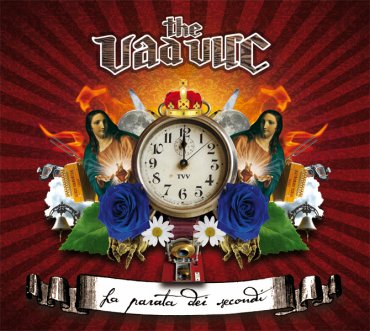
Dall'album La parata dei secondi
Il Matto è un re che non capisce
(Continues)
(Continues)
Contributed by DonQuijote82 2010/3/7 - 12:36
Copperhead Road
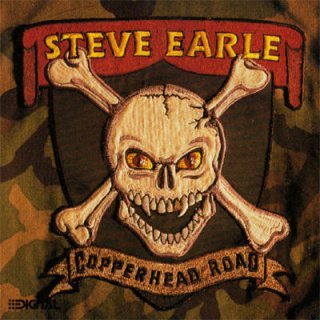
[1988]
Lyrics & Music by Steve Earle
Album: Copperhead Road
"John Lee Pettimore is, of course, a fictitious character: he is the son and grandson of moonshiners who goes off to Vietnam and, upon his return, becomes a marijuana cultivator and salesman..."
Lyrics & Music by Steve Earle
Album: Copperhead Road
"John Lee Pettimore is, of course, a fictitious character: he is the son and grandson of moonshiners who goes off to Vietnam and, upon his return, becomes a marijuana cultivator and salesman..."
Well, my name's John Lee Pettimore
(Continues)
(Continues)
Contributed by giorgio 2010/3/7 - 11:38
×
![]()


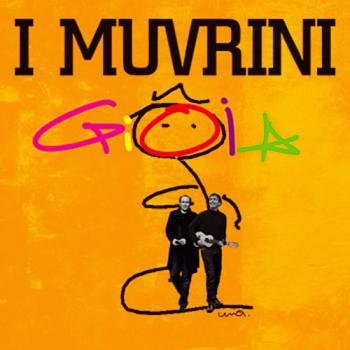


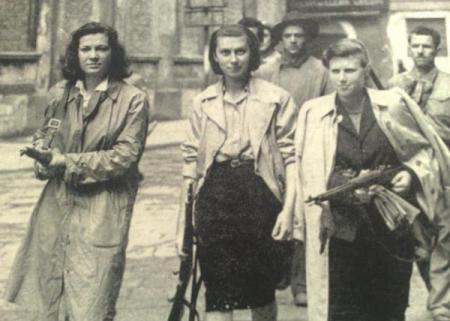



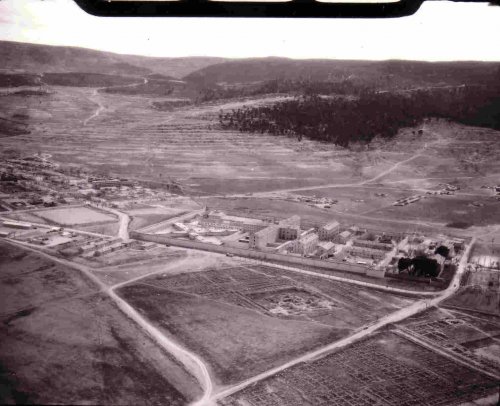



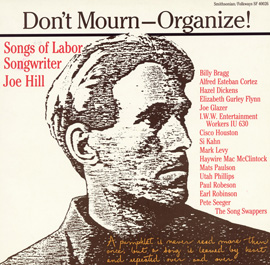
ho letto molti interventi che condannano l'inserimento
del tra lla llero.
non concordo è la parte più bella della canzone
se è un falso è fatto benissimo
credo che tutti i frequentatori di questo sito internet
sanno che le canzoni di protesta potevano essere veicolate
solo se divulgate in modo mascherato è la storia della musica (cito il film riso amaro) cioè tutti gli studiosi di musica popolare conoscono queste tecniche penso alla capoera brasiliana alla musica popolare italiana è normale
aggingere (se di aggiunta si tratta)un trallà 'llero
anzi bilancia il brano che diventa quasi dark viceversa sarebbe (musicalmente con rispetto)lagnoso.grazie
enrico